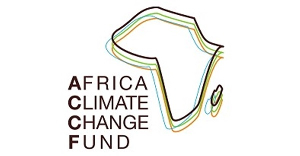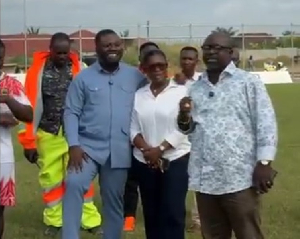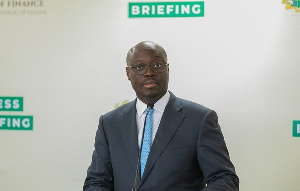In the realm of climate action, the pivotal role of Civil Society Organizations (CSOs) cannot be overstated. Their grassroots presence and community-driven initiatives often spearhead impactful projects aimed at climate resilience and adaptation. Recognizing this, the Africa Development Bank Group (AfDB) launched the Africa Climate Change Fund (ACCF) in 2014, later converting it into a Multi Donor Trust Fund in 2017. On the 17th of May 2024, a significant training session was held to shed light on the fund's opportunities and how CSOs can leverage it for transformative change.
Cedric Dzelu and Evans Asamoah Adjei unpacked the nitty-gritty of the fund in a simplified manner to aid Civil Society Organizations (CSOs) in being well-informed and to facilitate the sharing of information on the process. This milestone event marked a significant stride towards bolstering climate resilience and adaptation efforts across the continent.
The focus of the ACCF is clear: to support African CSOs dedicated to environmental and climate change causes. The recent training session delved into the grant opportunities offered by the fund, the application process, and how it empowers African nations towards climate-resilient development. Central to the discussion was the role of civil society in achieving the objectives set forth by the Bank.
The grants provided by the ACCF aim to achieve several key objectives:
1. Inclusion and Participation: Promoting local solutions by involving communities in project development and implementation.
2. Ownership: Ensuring that projects are owned and driven by the communities they serve.
3. Risk Management: Increasing the sustainability of operations and reducing the risk of project failure.
4. Transparency and Accountability: Upholding transparency and accountability to citizens in the regional member countries of the Bank.
5. Maximizing Impact: Ensuring projects have a lasting impact on key development indicators and promote sustainability.
The Bank's engagement with Civil Society spans various levels:
1. Informing Priorities: CSOs play a crucial role in informing the priorities of the Bank's work, ensuring it aligns with the needs and aspirations of citizens.
2. Contribution to Priority Areas: CSOs actively contribute to priority areas identified by the Bank in support of member/country developmental plans.
3. Project Cycle Engagement: Civil society is engaged throughout the project cycle, from identification to completion, promoting community ownership and sustainability.
4. Implementing Partners: CSOs often serve as implementing partners for Bank-funded projects, leveraging their grassroots expertise and networks.
Over the years, the ACCF has funded 28 projects across various sectors, including climate finance readiness, adaptation, mitigation, institutional capacity building, and gender equality. The 2024 funding cycle is particularly focused on sectors such as methane abatement, oil and gas support, agriculture, solid waste management, and scaling access to climate finance.
To access funds, organizations can register for eligibility and submit applications through the SMAPPLY Platform https://cse.afdb.org/ Organizations are encourage to study the timelines for the fund and be diligent in the application process.
1. June 28, 2024: Launch of the call for proposals. Organizations can begin submitting their project proposals through the SMAPPLY Platform.
2. July 26, 2024: Deadline for submission of proposals. All proposals must be submitted by this date to be considered for funding.
3. July 27 - August 9, 2024: Screening process and request for full proposals sent to shortlisted proponents. Proponents whose proposals pass the initial screening will be requested to submit detailed full proposals for further evaluation.
4. September 6, 2024: Deadline for submission of full proposals. Shortlisted proponents must submit their comprehensive project proposals by this date.
5. September 30 - Mid-October 2024: Evaluation of full proposals and feedback sent to applicants. The ACCF team will review all submitted proposals, assess their viability and alignment with fund objectives, and provide feedback to applicants.
6. October - November 2024: Appraisal phase. Approved proposals will undergo further scrutiny, including procurement and financial management assessments. Final proposals will be submitted for approval, and successful projects will proceed to implementation.
In essence, the Africa Climate Change Fund represents a vital opportunity for African CSOs to drive impactful change in their communities, fostering climate resilience and adaptation from the ground up. Through strategic partnerships and proactive engagement, civil society can harness the resources of the ACCF to catalyze transformative action and build a sustainable future for generations to come.
Authors:
Cedric Dzelu
AACJ-AYC Youth Focal Person & Executive Director, Frontline for Climate Action cedricdzelu@gmail.com
Evans Asamoah Adjei
Chief Resilience and Sustainability Officer (CRSO) to Accra Metropolitan Assembly adjeiquecu@yahoo.com
Opinions of Friday, 17 May 2024
Columnist: Cedric Dzelu and Evans Asamoah Adjei















